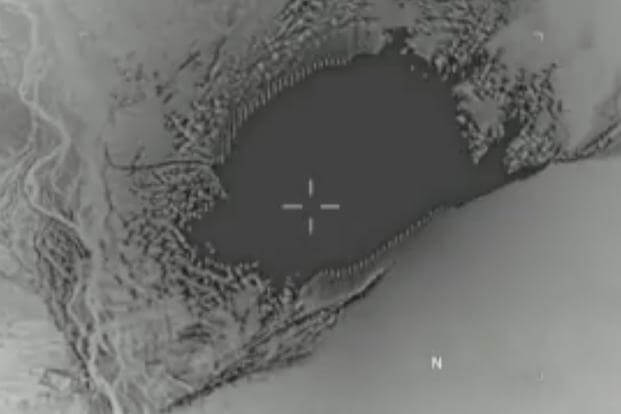Defense Secretary Jim Mattis showed distaste Thursday for using body counts to gauge progress and declined to give an estimate on the number of ISIS fighters killed in the MOAB bombing in Afghanistan.
In a brief news conference during his Mideast trip, Mattis said his reluctance to use body counts in a public relations attempt to show success dates back to Vietnam.
"For many years, we have not been calculating the results of warfare by simply quantifying the number of enemy killed," Mattis told reporters traveling with him. "You all know of the corrosive effect of that sort of metric back in the Vietnam War. It's something that has stayed with us all these years."
Several U.S. generals have on occasion estimated that 50,000-60,000 Islamic State of Iraq and Syria militants have been killed since 2014, but Mattis said, "You don't want to start calculating things, as far as what matters, in the crude terms of battle casualties."
Mattis was responding to a question on estimates by Afghan officials that nearly 100 fighters of an ISIS offshoot called Islamic State-Khorasan Province were killed April 14 when the U.S. dropped a GBU-43 Massive Ordnance Air Blast bomb on what was described as a tunnel and cave complex in eastern Nangarhar province.
Mattis said U.S. troops would not get involved in a body count. "Frankly, digging into tunnels to count dead bodies is probably not a good use of our troops' time when they're chasing down the enemy that's still capable," he said.
In Vietnam, body counts from U.S. search-and-destroy missions were a staple at what became known as the "Five O'Clock Follies," the routinely upbeat daily press briefings in Saigon.
Mattis did not spell out who gave the final order to drop the MOAB and its nearly 11 tons of high explosives, but indicated that Army Gen. John Nicholson, commander of U.S. Forces-Afghanistan and the NATO Resolute Support mission, had wide discretion to act on his own.
"We give parameters to our subordinate commanders in the field," Mattis said.
He said he was kept informed on the progress of the fight in Nangarhar but added, "In a conflict situation, you have got to leave initiative in the hands, delegate initiative, to those you consider competent to do so."
As a Marine division commander, Mattis was known for giving his regimental commanders an "avenue of approach" to the enemy and then allowing them wide latitude on the tactics used to achieve the mission.
"In this case in Afghanistan," he said, "they had been engaged in that fight up in that corner for some time. I will not get into what authorities are delegated, but it was no surprise in terms of the effects of that battle at all" when the MOAB was dropped.
"The battle was going on and they were going to use what was necessary to break ISIS," he said.
The Afghan Ministry of Defense said Thursday that only technical personnel are being allowed at the site of the bombing because of continued fighting in the area and the presence of mines, Afghanistan's Tolo news agency reported.
"We are in the area, but it is filled with mines in every inch. You are aware that it was one of the biggest strongholds of Daesh [ISIS]. They wanted to keep it safe this way. We are clearing the area," said Mohammad Radmanesh, a deputy spokesman for the Ministry of Defense.









